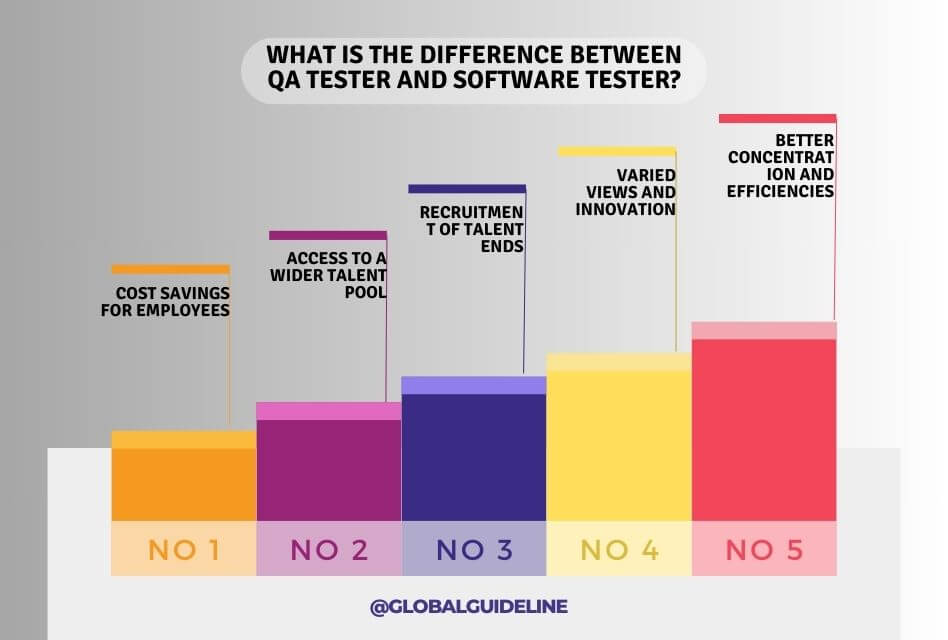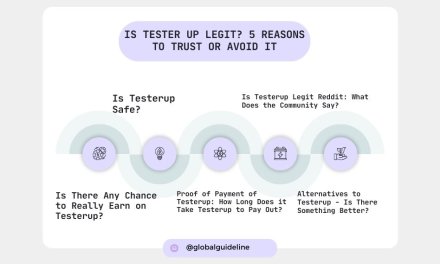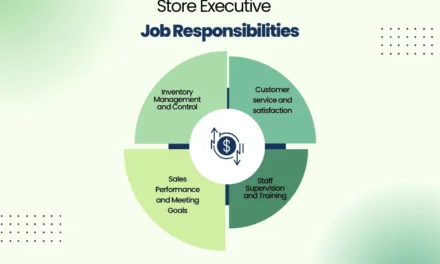Today, in a fast-paced digital world, the practice of QA makes sure that software products adhere to the most stringent demands in terms of quality, functionality, and user experience. Quality assurance is, therefore, highly relevant for software development, especially with the growing demand for this product. With rising demand, there naturally would be a growing demand for skilled remote quality assurance testers. In the USA, a changing dynamics in work and lifestyle led to significant changes by allowing various professionals to engage in projects anywhere. Among them were quality assurance testers who could now work anywhere. Thus, this article discusses the top 5 benefits of a remote quality assurance tester in the USA, emphasizing why this career is rewarding and essential for any modern business.
Table of Contents
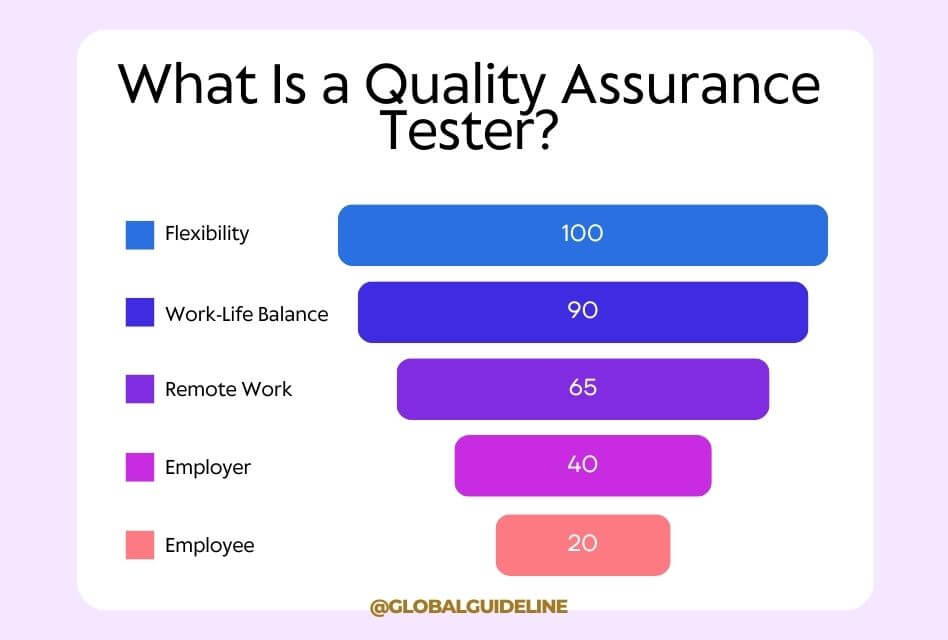
What Is a Quality Assurance Tester?
Quality assurance tester – Let’s begin first of all by clarifying what a quality assurance tester is. In essence, quality assurance testers ensure the correctness of software applications and their ability to meet the requirements defined in business terms. Their set of activities also includes the revision and verification of quality standards and test procedures besides functional testing, that is, manual and automation testing.
Does QA just boil down to testing? While testing is indeed the prominent part of QA, it is much more than that. QA testers do cross-functional teams work to identify problems early in the development cycle, develop test plans and test cases, and ensure that all aspects of the software achieved their desired quality standards.
1. Flexibility and Work-Life Balance
One of the most significant benefits of being a remote quality assurance tester is the flexibility with the job role. Due to the ability to work from a remote location, the QA testers are better enabled to plan their schedules. Thus, they are able to achieve a better balance between work and personal life. This flexibility is particularly very important in the USA where long commutes and high demands by work hours are common.
Remote Work and Flexibility
Among the most valuable benefits related to jobs for remote QA testers is the freedom to work from anywhere, be it at home, a co-working space, or while traveling. Because testers are free to create their own workspace, which fits any personal needs and preferences, they can also be more job-satisfied.
There are even remote SQA jobs available, which can be either part-time or full-time positions, chosen by individual preference and lifestyle. This flexibility of working from the comfort of home makes remote QA positions quite suitable for those trying to find the time to balance between working and other activities or commitments, such as family or further education.
Quality assurance tester remote jobs in the USA are in great demand, only because companies realize more than ever before the benefits from the flexible workforce. The companies get better people having the choice to work from anywhere in the country.
2. Cost Savings for the Employer and Employee
Another significant advantage of remote QA jobs is the cost savings it renders to the employer and the employee. To a company, hiring remote QA testers saves them on some overhead costs like office space, utilities, and equipment, among others. To an employee, the work can save them from the tiredness associated with commuting, the extra money spent on work clothes, and on food for lunch.
Cost Benefits for the Employer
Another significant benefit of employing offsite quality assurance testers to companies is cost saving on the operation and maintenance of a physical office. This is very useful for saving the much-needed budgets in startups and small companies. This also lowers the turn-over rate since people who enjoy working from home will stick with the firm for an extended period of time.
What is the difference between QA tester and software tester? While both are concerned with testing the software, QA testers are mainly more concerned with the general process in relation to the quality standards achieved throughout all aspects of the software. The opposite is true for software testers as they might be given more tasks on a specific functionality or aspect of the software.
Cost Savings for Employees
For remote QA testers, the ability to work from home negates a commuting need, thus saving time and money. In addition, an opportunity for remote work is in reduced overhead due to no professional wardrobe necessary during working hours or lunches outside home. Such savings can be translated into quality-of-life improvements and higher financial stability.
How much do quality assurance testers make? Salaries for remote QA testers vary widely with experience, location, and company. Nonetheless, it is only fair to say that the remote QA tester usually gets competitive salaries with cost-saving advantages of working from home.
3. Access to a Wider Talent Pool
One of the primary benefits of hiring remote QA testers for companies is access to a larger talent pool. Companies are free from the geographical constraint and can recruit the best talent from all parts of the country or even the world at large. This means that there will be a more diversified and skilled workforce to improve software testing.
Recruitment of Talent Ends
In fact, by employing remote QA tester jobs, it allows companies to recruit other-than-those otherwise inaccessible talents. Such is especially the case in relation to positions of the tech industries that require specific skills or experiences. Indeed, hiring the best candidate for a company should become relatively easy if one is offering jobs for remote candidates-this way, the bottom line must surely come out right.
Jobs in manual QA testing that are remote and offshore testing worldwide are gaining much popularity due to the increased business need for hiring remote workers. It has allowed the business access talent with the specific needed skills anywhere in the world.
The nature of jobs remote related to software quality assurance analysts and testers tend to unlock opportunities for a wide range of diverse contributions based on experience towards more innovative and efficient testing processes.
Varied Views and Innovation
Diverse teams bring varied perspectives, thus possibly increasing the innovation on the solutions to be presented in terms of problem-solving and creativity for software development. Moreover, innovation may also come from the end with diverse teams, in terms of thorough testing since various team members may identify issues that others might not.
This means that remote quality assurance testers contribute to bringing more inclusion and effectiveness into software products, because from an abundance of different viewpoints, they make sure the software caters to the widest needs in a much larger set of users.
4. Increased Productivity and Concentration
Remote work setups generally enhance conditions of increased productivity and concentration in most cases. This is due to the nature of non-stop tasks that people like the QA testers undertake, which requires deep concentration. As a result, there will be more efficient and accurate testing by the remote QA testers since they have fewer distractions than in a typical office setup.
Better Concentration and Efficiencies
Working from a remote location allows QA testers to set up a personal environment for work without distractions. This may result in more efficient workflows and higher-quality outputs. For the most part, remote work situations allow for more flexible scheduling, which enables testers to work during their most productive hours.
Better quality work can also be achieved in QA testing with virtual settings, since the test works independently and can actually organize his or her work schedule freely to suit him or her individual style of preference. Such an allowance can ensure that more effective and comprehensive testing procedures are conducted.
The salary of a remote quality assurance tester usually is an incentive for increased productivity and concentration due to working remotely. Actually, companies compete through salaries for a QA tester since they are assured of excellent results that can be delivered when working in a distant setting.
Work-Life Integration
Remote work can help achieve better integration of work with personal life so that overall satisfaction is higher. The person can alleviate stress and burnout, hence a highly motivated employee.
Is a QA tester a developer? Although QA testers and developers work very closely together, their tasks are quite different. For QA testers, the primary focus is on testing the quality of the software; while for developers, the major task lies in writing and maintaining the code. However, to be successful in the identification and resolution of probable problems, substantial knowledge about software development is required for a QA tester.
5. Career Advancement Scope
Remote QA jobs come with a lot of scopes for career developments and advancement. As the culture of remote working shifts upwards, companies have started to make efforts toward encouraging training and professional development among the working-from-remote employees and upgrading the skills and progressing them from anywhere.
Professional Growth and Training
Many companies understand the fact that a remote employee’s learning process needs to be lifelong. Therefore, they ensure all possible online courses, webinars, and certification programs that keep the QA tester updated with all the latest industry trends and technology.
Advanced testing techniques, like test automation, represent emerging issues in the QA field. Remote QA testers can take advantages of this trend by investing more in their professional development as means of repositioning themselves into more senior roles that may include the role of an automation engineer or lead QA.
Working as a remote quality assurance tester would expose a person to different projects that develop one’s skill set. Experience gained may lead to advancement within the firm in which it was acquired or lead one to new opportunity in the larger job market.
Networking and Teamwork
There is no isolation when working from home. Most corporations make use of collaborative tools and platforms that facilitate the socialization of remote QA testers with their fellow colleagues and peers; it allows for the sharing of ideas and styles that could be used in other projects. With this network comes new avenues for professional development and also professional networking.
A good entry-level option for new professionals is remote QA tester jobs to gain experience, build the contacts, and get closer to career goals. Organized work communities from remote work organizations provide professional growth for remote QA testers- even while working remotely.
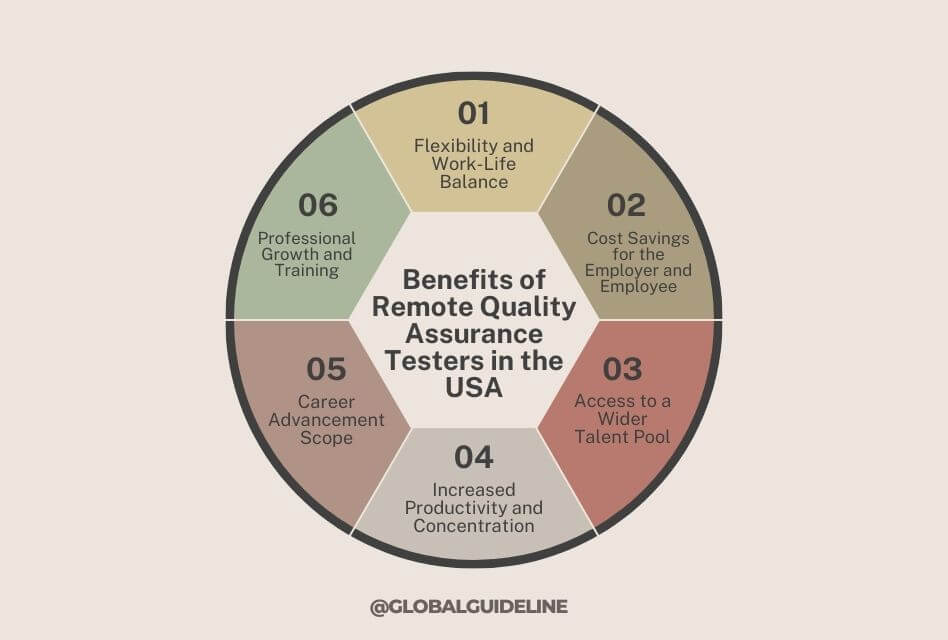
Some of the interview questions for the job of remote quality assurance testers are as follows:
Chances are that you will have an interview about a remote quality assurance tester position. This, of course, means you will be prepared to answer both technical and behavioral questions. Here is some of what you might expect:
- What is a quality assurance tester?
Be ready to tell them what you understand by the role of a QA, key tasks, and responsibilities involved in that role. - How would you approach remote work, and how do you keep your productivity?
Employers want to know how you manage your time and stay focused while working from home. - Can you tell me about a time that you identified a really critical issue during test?
This is a problem-solving/attention-to-detail kind of question, which is very important when you’re a QA. - What’s in it for you applying for this remote QA position?
They’ll be seeking people who are truly passionate about how remote work can benefit them and who know what that means. - How do you collaborate with a cross-functional team when you’re remote?
It’s asking you to describe how you communicate and work with others even when you’re not in the same place.
FAQs
1. What is a quality assurance tester?
A quality assurance tester tests the correctness of applications and ensures software runs according to the requirements and specified business needs by carrying out several tests and updating quality standards.
2. Does a QA tester need to know how to code?
It is not usually necessary, but some basic knowledge helps especially for test automation work.
3. How much do quality assurance testers make?
Salaries for QA testers do not follow any uniform criteria; however, a remote QA tester in the USA will draw fairly competitive wages, generally at a minimum up to and over the range of $50,000 to $80,000 yearly, depending on experience and location.
4. What is the difference between a QA tester and a software tester?
The key difference is that the QA tester focuses their attention on the overall process of quality, whereas a software tester may have to zero in on some of the specified functionalities or features of the software.
5. Is a QA tester a developer?
QA testers and developers have different functions but a broad knowledge base of software development will ensure the best practices of QA testing are adopted.
6. What are the advantages of remote quality assurance testing?
Advantages feature flexibility, cost cutting, access to the large talent pool, higher productivity, and career advancement and professional development opportunities.
7. How do I find remote QA tester jobs?
There are remote QA tester positions which one can find in job boards, company sites, and through networking within the industry. Popular job search platforms often have listings for a remote quality assurance tester’s jobs.
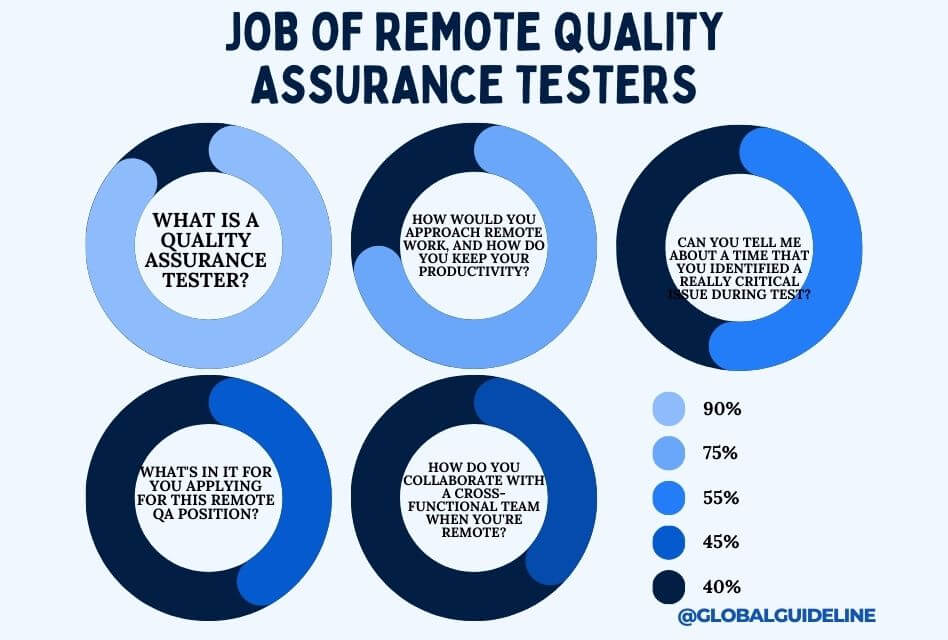
Conclusion
Nowadays, with the digital landscape growing in size, the role of a remote quality assurance tester is very significant. With benefits such as flexibility, savings on cost, diversity in the pool of skilled talent they have available, increased productivity, and possibly career growth, remote QA positions contribute an enjoyable dynamic approach towards a career. Experienced and new testers are provided with great opportunities for career advancement in this trend towards remote work as they can take advantage of all the above benefits from anywhere.
As you learn more about remote QA testing, think about its specific pros and cons. If your skills and approach are suitable for this career path, you can most definitely succeed as a remote quality assurance tester on cutting-edge software projects.
Related Posts:
Why 3 Software Engineering Jobs Near Me Are Unmatched in USA

